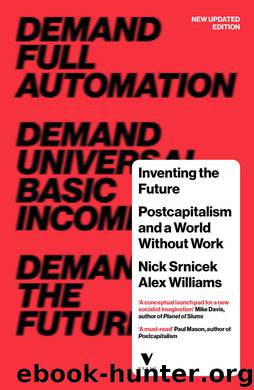Inventing the Future: Postcapitalism and a World Without Work by Nick Srnicek

Author:Nick Srnicek [Srnicek, Nick]
Language: eng
Format: epub
Publisher: Verso
Published: 2016-09-30T22:00:00+00:00
NAVIGATING NEOLIBERALISM
While utopias seek to transform the cultural hegemony of neoliberalism, education forms a key institution for transforming intellectual hegemony. It is the educational apparatus that indoctrinates new generations in the dominant values of a particular society, reproducing its ideology through the decades. In the education system, children learn the basic ideas of a society, respect for (in fact, submission to) the existing order, and the skills necessary to distribute them along different segments of the labour market.58 Transforming the educational system of intellectuals is therefore a key task in building a new hegemony.59 It is not for nothing that the Nobel Prize–winning economist Paul Samuelson wrote that: ‘I don’t care who writes a nation’s laws, or crafts its advanced treatises, if I can write its economics textbooks.’ Projects focused on changing this institutional element of society could focus on three broad goals: pluralising the teaching of economics, reinvigorating the study of leftist economics and expanding popular economic literacy.
It is often forgotten, so deeply are we embedded in neoliberalism, that economics was once a relatively pluralist discipline. The interwar period was a time of healthy competition between a variety of formalist and non-formalist approaches.60 In academic journals, it was not unusual to see discussions of economic planning, the tendency for the rate of profit to fall, and other standard categories of Marxist economics. In the 1960s, the Cambridge capital controversy brought together heterodox and mainstream thinkers in a seminal debate about the foundations of the discipline – one that everyone admits the heterodox thinkers won.61 As late as the 1970s, one of the founders of modern economics was discussing exploitation, the labour theory of value and the transformation problem in a leading economics journal.62 Such an event is difficult to imagine today. While neoclassical economics is a large tent that contains a variety of approaches, it is nevertheless a fundamentally limited perspective on what counts as real economic knowledge. This problem is compounded by the particular methodological demands of the most preeminent journals, with formal modelling taking precedence over more sociological analyses and qualitative understandings.
If the broad cultural and academic ideas of how to run economies are to change, at a minimum it will require more pluralism in the education of students. Here, there are glimmers of hope for a pluralist revival. Work is being done across the world to bring alternative economics to mainstream universities, and groups of students and professionals alike are beginning to mobilise around this issue. Since 2000, numerous universities have seen students vocally demand pluralism in their economics education.63 More recent years have seen students openly protesting the defenders of mainstream economics, and the emergence of groups like the Post-Crash Economic Society and Rethinking Economics that are making concerted efforts to change the curriculum.64 Essential to a project of pluralising economics, however, is the development of a research programme and textbooks. Part of the reason for the rise of formalist approaches is precisely their fit with institutional requirements of higher education: they provided theories for
Download
This site does not store any files on its server. We only index and link to content provided by other sites. Please contact the content providers to delete copyright contents if any and email us, we'll remove relevant links or contents immediately.
| Anthropology | Archaeology |
| Philosophy | Politics & Government |
| Social Sciences | Sociology |
| Women's Studies |
Cecilia; Or, Memoirs of an Heiress — Volume 1 by Fanny Burney(32558)
The Great Music City by Andrea Baker(32018)
Cecilia; Or, Memoirs of an Heiress — Volume 2 by Fanny Burney(31956)
Cecilia; Or, Memoirs of an Heiress — Volume 3 by Fanny Burney(31941)
We're Going to Need More Wine by Gabrielle Union(19046)
All the Missing Girls by Megan Miranda(16026)
Pimp by Iceberg Slim(14506)
For the Love of Europe by Rick Steves(14121)
Bombshells: Glamour Girls of a Lifetime by Sullivan Steve(14073)
Talking to Strangers by Malcolm Gladwell(13370)
Norse Mythology by Gaiman Neil(13363)
Fifty Shades Freed by E L James(13239)
Mindhunter: Inside the FBI's Elite Serial Crime Unit by John E. Douglas & Mark Olshaker(9341)
Crazy Rich Asians by Kevin Kwan(9291)
The Lost Art of Listening by Michael P. Nichols(7506)
Enlightenment Now: The Case for Reason, Science, Humanism, and Progress by Steven Pinker(7313)
The Four Agreements by Don Miguel Ruiz(6765)
Bad Blood by John Carreyrou(6621)
Weapons of Math Destruction by Cathy O'Neil(6279)
